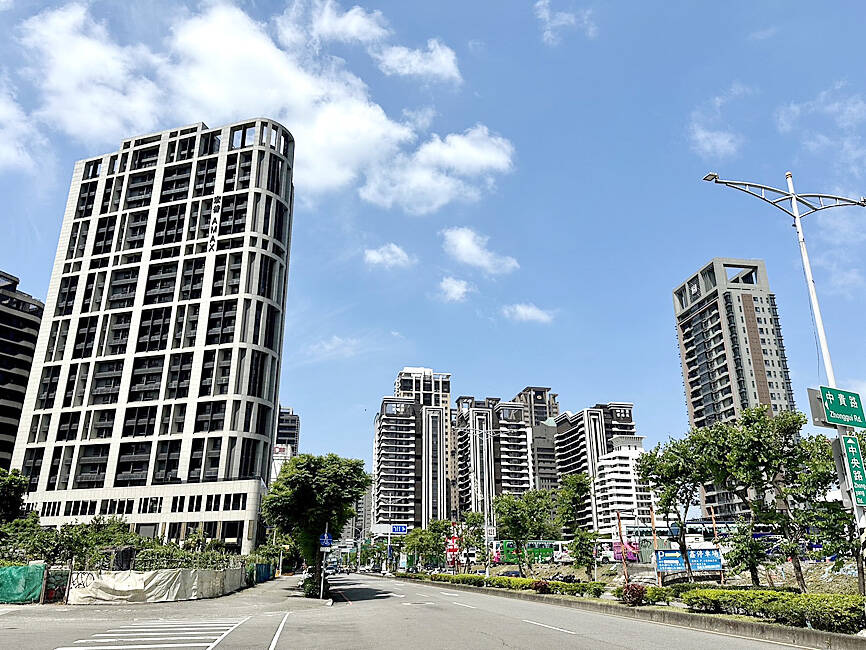Major commercial property transactions in Taiwan were lackluster in the first six months of this year, compared with the strong residential market, due to a high comparison base over the same period last year, property broker Savills Taiwan (第一太平戴維斯) said yesterday.
Commercial property deals of more than NT$300 million (US$9.23 million) totaled NT$65.8 billion in the first half of this year, suggesting a 10 percent retreat from a year earlier, due mainly to an unfavorable comparison base linked to the liquidation sales of buildings owned by a real-estate investment trust (REIT).
The Shin Kong No. 1 REIT (新光一號) sold its six buildings in Taipei for NT$30.7 billion in the second quarter of last year.

Photo: Hsu Yi-ping, Taipei Times
Lingering inflation and restrictive monetary policy helped weigh on the commercial segment of the real-estate market, unlike residential properties that have benefited from favorable lending terms and wealth inflation induced by stock rallies at home and abroad.
Office buildings appeared to be the most in demand, generating NT$23.7 billion of the deals, or 36 percent, Savills Taiwan said.
Tatung Co (大同) sold an old office building in Taipei’s Daan District (大安) for NT$13.13 billion, equivalent to NT$15.26 million per ping (3.3m2) for the land on which the buyer group indicated it plans to build a luxury apartment complex after securing more nearby plots, it said.
Rich Development Inc (力麒建設) sold its headquarters to an institutional buyer for NT$1.28 billion and an individual investor acquired an office building near Yuanshan MRT Station for NT$1.8 billion, it said.
The deals reflected keen interest in existing office buildings by investors seeking future value gains, Savills Taiwan said.
By contrast, corporate buyers prefer presale or newly completed office buildings that can better meet self-occupancy and energy conservation needs, as well as enhance their working efficiency, it added.
Industrial properties are also popular, driving a sizeable NT$17.5 billion of the transactions, the broker said.
I-Hwa Industrial Co (怡華實業) bought an old plant in New Taipei City for NT$3.1 billion, Sigurd UTC Corp (矽格聯測) purchased a used plant in Hsinchu City for NT$1.68 billion and Delta Electronics Co (台達電) acquired two buildings in Taipei’s Neihu District (內湖), it said.
Property developers emerged as the most active buyers, pouring NT$21.3 billion into the commercial property market so far this year, followed by technology firms at NT$16.2 billion, Savills Taiwan said.
Developers are buying old buildings to replenish their land holdings, while semiconductor firms are expanding their research and development capacity as a result of a boom in demand for artificial intelligence products, the broker said.

POWERING UP: PSUs for AI servers made up about 50% of Delta’s total server PSU revenue during the first three quarters of last year, the company said Power supply and electronic components maker Delta Electronics Inc (台達電) reported record-high revenue of NT$161.61 billion (US$5.11 billion) for last quarter and said it remains positive about this quarter. Last quarter’s figure was up 7.6 percent from the previous quarter and 41.51 percent higher than a year earlier, and largely in line with Yuanta Securities Investment Consulting Co’s (元大投顧) forecast of NT$160 billion. Delta’s annual revenue last year rose 31.76 percent year-on-year to NT$554.89 billion, also a record high for the company. Its strong performance reflected continued demand for high-performance power solutions and advanced liquid-cooling products used in artificial intelligence (AI) data centers,

SIZE MATTERS: TSMC started phasing out 8-inch wafer production last year, while Samsung is more aggressively retiring 8-inch capacity, TrendForce said Chipmakers are expected to raise prices of 8-inch wafers by up to 20 percent this year on concern over supply constraints as major contract chipmakers Taiwan Semiconductor Manufacturing Co (TSMC, 台積電) and Samsung Electronics Co gradually retire less advanced wafer capacity, TrendForce Corp (集邦科技) said yesterday. It is the first significant across-the-board price hike since a global semiconductor correction in 2023, the Taipei-based market researcher said in a report. Global 8-inch wafer capacity slid 0.3 percent year-on-year last year, although 8-inch wafer prices still hovered at relatively stable levels throughout the year, TrendForce said. The downward trend is expected to continue this year,

Vincent Wei led fellow Singaporean farmers around an empty Malaysian plot, laying out plans for a greenhouse and rows of leafy vegetables. What he pitched was not just space for crops, but a lifeline for growers struggling to make ends meet in a city-state with high prices and little vacant land. The future agriculture hub is part of a joint special economic zone launched last year by the two neighbors, expected to cost US$123 million and produce 10,000 tonnes of fresh produce annually. It is attracting Singaporean farmers with promises of cheaper land, labor and energy just over the border.

A proposed billionaires’ tax in California has ignited a political uproar in Silicon Valley, with tech titans threatening to leave the state while California Governor Gavin Newsom of the Democratic Party maneuvers to defeat a levy that he fears would lead to an exodus of wealth. A technology mecca, California has more billionaires than any other US state — a few hundred, by some estimates. About half its personal income tax revenue, a financial backbone in the nearly US$350 billion budget, comes from the top 1 percent of earners. A large healthcare union is attempting to place a proposal before